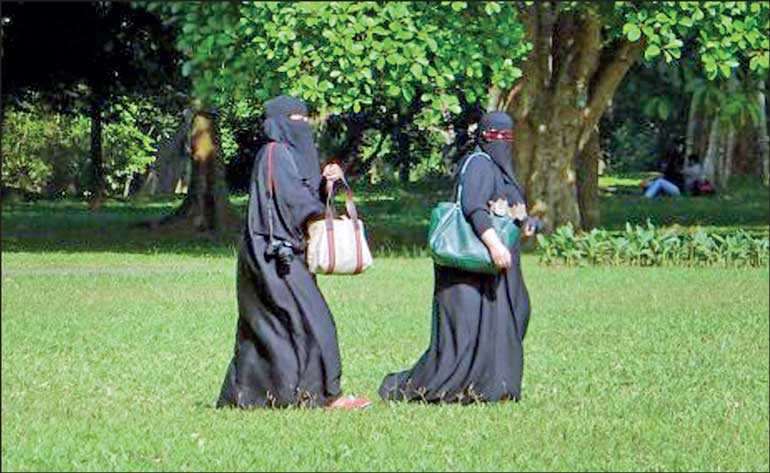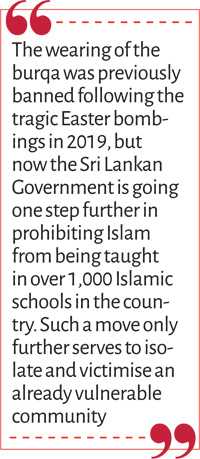Sunday Feb 22, 2026
Sunday Feb 22, 2026
Saturday, 20 March 2021 00:00 - - {{hitsCtrl.values.hits}}

Muslims only make up 10% of the total population of Sri Lanka, alongside the 70% that are Buddhists and the 15% that are Tamil. Only a small percentage of Sri Lanka’s Muslim women wear the burqa, meaning that they make up just a tiny fraction of Sri Lanka’s 22 million people. It is strange that the Government sees this as a threat
By Tasnim Nazeer
 thediplomat.com: Sri Lanka’s recent announcement banning the burqa (among other face coverings) and its shuttering of over 1,000 Islamic schools in the country is a testament to the Government’s tendency to advance an Islamophobic agenda under the guise of national security.
thediplomat.com: Sri Lanka’s recent announcement banning the burqa (among other face coverings) and its shuttering of over 1,000 Islamic schools in the country is a testament to the Government’s tendency to advance an Islamophobic agenda under the guise of national security.
Minister of Public Security Sarath Weerasekara stated that the decisions to ban the burqa and close Islamic schools was due to the fact that he felt it had a “direct impact on national security” and that the face covering was a sign of “religious extremism”. But the fact is that these steps are a direct violation of human rights and freedom of religious expression.
The wearing of the burqa was previously banned following the tragic Easter bombings in 2019, but now the Sri Lankan Government is going one step further in prohibiting Islam from being taught in over 1,000 Islamic schools in the country. Such a move only further serves to isolate and victimise an already vulnerable community.
As a British Sri Lankan Muslim myself, one who wears the hijab, I know only too well how much Islamophobia has risen in the country. Many of my family members still live in Sri Lanka, where they fear being unjustly targeted due to their Islamic faith. These fears are legitimate, given the Government’s clear anti-Muslim stance. Many Muslims report being treated unfairly whether in employment or in business, especially if they are visibly Muslim: wearing a hijab or burqa for women, or in men’s case keeping a beard.
Just walking down the street in the bustling capital of Colombo, Muslim women are taunted, harassed, and ridiculed for wearing Islamic attire. This is unacceptable. I myself experienced abuse in the airport in Sri Lanka when I visited the country in 2019. A fellow Sri Lankan demanded that I remove my hijab and I was shouted at, but no one intervened to help. It is common for Police and authorities to do nothing at all when it comes to Islamophobic abuse directed at the Muslim population. Instead, they watch silently without attempting to reprimand the perpetrators.
Since my last visit to Sri Lanka things have only taken a turn for the worse. In 2020, the Government made cremation mandatory for all Muslims who die of COVID-19, but many Muslim families say deceased loved ones who tested negative for the virus were cremated against their wishes. Human rights groups and the World Health Organisation stated that there was no harm in burial, yet the Sri Lankan government was adamant in not letting Muslims enact the rites of burying the dead.
If a Government cannot even allow someone to undertake these final rites, the news of the burqa ban and the closing of schools is not surprising in the least.
Since I was a child, I have visited Sri Lanka almost every other year and have fond memories of the country’s people all living harmoniously with one another. However, over the years, I have seen how the present Government has targeted the Muslim minority and further tried to cause divisions between communities.
After the rise of former President Mahinda Rajapaksa, who today is Prime Minister, minority Muslims and Tamils were victimised and singled out, facing attacks on their houses, businesses, and homes. Anti-Muslim sentiment was on the rise as far back as 2014 during the Aluthgama riots, when many Muslims were killed by hard-line extremists.
The Rajapaksa Government has been waiting for an opportunity to further crack down on Muslims in the country and they sadly used the Easter bombings to weaponise its own political agenda. Once President Gotabaya Rajapaksa came to power in 2019 things started to get worse. We now have two of the Rajapaksa brothers, notorious for their actions against minority Tamils and Muslims, using their power and influence to reprimand the Muslim community and drive them out.
Muslims only make up 10% of the total population of Sri Lanka, alongside the 70% that are Buddhists and the 15% that are Tamil. Only a small percentage of Sri Lanka’s Muslim women wear the burqa, meaning that they make up just a tiny fraction of Sri Lanka’s 22 million people. It is strange that the Government sees this
as a threat.
Most Muslim women who do choose to wear it are happy to identify themselves for national security reasons. Banning the burqa will only further isolate Muslims and cause more fear in an already vulnerable community. Sadly, all indications are that the Sri Lankan Government will continue to evade accountability and justice for its ongoing human rights violations.
(Tasnim Nazeer is an award-winning journalist and Universal Peace Federation Ambassador for Peace.)
(Source: https://thediplomat.com/2021/03/sri-lankas-burqa-ban-is-more-about-islamophobia-than-national-security/)